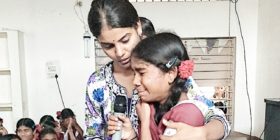From earning Rs 5 a day as a farm labourer to starting an IT services company that is worth Rs 1.5 crore (Rs 15 million), Jyothi Reddy’s story of success is nothing short of an inspiring movie plot.
That night she decided to break the rules.
With a few friends, whom she referred as akka, she did not return to the orphanage till way past midnight.
It was Sivaratri, the great night of Shiva, when the planets are potently aligned to embrace his cosmic dance.
After visiting the Shiva temple in their village, they decided to do something really daring — go for a movie, a blockbuster love story.
She laughs, a deep throaty laugh, which betrays a teenager’s giggles at the memory of forbidden pleasure.
Anila Jyothi Reddy has travelled very far from that night and her obscure village in Warangal in Telangana.
Her memories though are as fresh as it were yesterday.
“When we returned late in the night, we got a good thrashing from the warden. But I was so enamoured by the movie that I did not much care for the repercussion. I thought I should also marry for love,” she tells me.
Not all dreams come true
But fate — the eternal party spoiler — intervened.
Jyothi was married off exactly a year later at the age of 16 to a man 10 years her senior.
Love did not figure in the arrangement that her parents made for her future.
All her hopes of a better life seemed to recede like the bullock cart in the rear view mirror of a speeding highway truck.
He was a farmer who had not even passed the intermediate.
She was thus doomed to a fate of a daily farm labourer slogging the whole day in the paddy field under the blazing hot Telangana sun.
For all her efforts, Jyothi earned a meagre Rs 5 a day. She did this for five years from 1985 to 1990.
“I became a mother at 17. I had to do all the household chores and then head straight to the fields.
“I would return home at dusk and get down to making dinner.
“We did not have any stove, so I had to cook on a wood fire chulha,” she tells me over the phone from Hyderabad, where she visits at this time of the year from her home in the US.
Today, Jyothi is the CEO of a $15 million IT company, Key Software Solutions, based in Phoenix, Arizona, US.
Her incredible story seems to be the stuff of fiction conjured up by a shrewd novelist inflicting numerous sufferings on his protagonist to eventually make her a winner.
Except here, Jyothi herself altered her destiny.
Unwilling to live a life that was preordained for her, she beat all odds to emerge a winner.
A forced orphan
Jyothi’s aspirations were slowly growing wings.
“I could not stand being poor. I was born poor and was wed into another poor family,” she says.
Those days her dream was to have four plastic boxes full of daal (lentils) and rice.
“I would dream of having more than enough food to feed my children. I did not want to give them the life I was leading.”
Having been married off at the age of 16, Jyothi became a mother at 17 with her first daughter, followed by another girl a year later.
“At 18, I was a mother to two girls. There was never enough money for either medicine or to buy them toys.”
When the time came to admit them in school, she opted for Telugu medium because the fees was Rs 25 a month, while for an English medium school it was Rs 50 per month.
“I could educate both my girls at Rs 50 hence I chose to send them to a Telugu medium school.”
Jyothi is the second among her four siblings.
Because of abject poverty at home, her father admitted his two daughters into an orphanage saying that they were motherless.
“I lived in an orphanage for five years from class five to class 10. Life there was tougher. My sister could not manage and would cry the whole time. My father had to take her back home.”
But Jyothi stuck on.
Even though she missed her mother and needed her the most, she finally adjusted to remaining in the orphanage.
“I remember a wealthy man would visit the orphanage every year to distribute sweets and blankets.
“I was a very sickly child then, and I would imagine myself being rich one day and carry a suitcase with 10 new saris in it,” she laughs re-imagining her dreams those days, which she was afraid to share with her hostel mates lest they made fun of her.
Nobody’s children
Jyothi makes it a point to come to India every year on August 29.
It is her birthday and she celebrates it with children in different orphanages in Warangal.
She also sponsors a mentally challenged kids’ home where there are 220 children.
She says passionately, “Two percent of India’s population comprises orphans. They do not have any identification. They are uncared for and unwanted. The people who work in orphanages only work there for the money, and not to give care and love to the orphans.”
She has been pursuing the cause of orphan children for many years now and has met ministers in power to bring the plight of these children to their notice.
She is concerned that though the state government has released data for orphan boys till class 10 who are in child remand homes, there is no data for girl orphans.
“Where are the girls? Why are they missing?” she asks and replies to her own question.
“Because they are trafficked; they are forced into prostitution. I visited one home in Hyderabad where six girls in their 10th class had given birth. In the same home, these mother orphans were living with their orphan children.”
Being in a position of power today, Jyothi is voicing her concerns at every forum and making sure that the plight of the orphans does not go unheard.
But there was a time when she had to be a mute spectator to the injustices meted out to her by her own husband and in-laws.
With many mouths to feed and little or no income, life was hard.
“My concern was my children. I had a lot of restrictions. I could not talk to any other men, could not go out besides going to work in the fields.”
But as they say where there’s a will, there’s a way.
Jyothi heard an opportunity knock on her door when she started teaching the other farm hands at a night school.
From a labourer, she became a government teacher.
“I would motivate them to learn the basics. That was my job. I soon got a promotion, and would visit every village in Warangal to train women and youth to learn to stitch clothes.”
She was now earning Rs 120 a month.
“It was as if I had got one lakh rupees. I could now spend on my children’s medicine. It was a lot of money for me.”
The American dream
She completed a vocational course from Ambedkar Open University and wanted to enroll for MA in English at Kakatiya University in Warangal.
“I had often dreamt of having a name plate outside my house with the words ‘Dr Anila Jyothi Reddy.'”
However, she could not pass her course and all her dreams of doing a PhD in English came to an end.
But a chance meeting with a cousin from the US fired her imagination and she knew it in her heart that if she had to escape this vortex of poverty she had to go to the US.
“This is too much, right? This is crazy,” she laughs again with joy in reply to my question on how she managed to go to the US.
Talking about her NRI cousin who inspired her, she says, “She had style. It was so different from my ‘teacher look’. I did not leave my hair loose, I did not wear goggles or drive a car. I asked her can I come to America.”
Her cousin told her, “An aggressive woman like you can easily manage in America.”
Jyothi did not waste any time and enrolled for computer software classes.
She would commute to Hyderabad daily because her husband did not like the idea of her living away from home.
She was determined to go to the US. But it was hard to convince her husband.
“I was really greedy to go to the US. That was the only way I thought I could give my children a good life.”
She took the help of relatives and friends to apply for a US visa.
“I make use of every resource and time that I can manage. I never wasted time even while teaching.
“I used to run a chit fund for the other teachers. My salary in 1994-95 was Rs 5,000, I used to earn Rs 25,000 from the chit fund — all this when I was only 23-24 years old.
“I tried to save as much as I could so that I could go to the US.”
Jyothi’s biggest desire was to drive a car, and she knew only if she went to the US, she could drive one.
“There were too many restrictions at home. But one good thing my husband has done is given me two children to fight my life,” she says with a chuckle.
“My girls are like me. They are hard workers and do not waste time.”
Her daughters are software engineers. They are both married now and live in the US.
From poverty to abundance
The American dream is not an easy one.
Though Jyothi fought her fate and reached the land of opportunities, it was a rough ride.
“There was no support for me there. I did not know English very well, and it was a struggle each day.”
She found a PG accommodation with a Gujarati family in New Jersey at $350 per month.
“I did not have a cell phone. I used to walk three miles daily to work.”
She worked as a sales girl, then as a room service person in a motel in South Carolina, as a baby sitter in Phoenix, Arizona, as a gas station attendant, and software recruiter in Virginia.
Finally, she started her own business.
“When I returned to my village after two years, I went to the village temple for Shiv puja and the priest told me, ‘You will not get a job in the US, but if you do business you will become a millionaire.’
“I laughed at him because I knew how hard it was in America.”
But those were prophetic words indeed. She finally took her daughters and her husband with her to the US.
According to her, the late President Abdul Kalam was her mentor, and he would tell her that between the ages of 11 and 16 years, a child builds character.
“I was in the orphanage in those years of my life. Even then I would help other children, and take care of those who cried and bought them ice lollies.”
Jyothi recalls how she would walk bare feet even during the harsh summer months.
Curious, I ask her how many shoes she owns today?
“I now have 200 pairs. It takes me 10 to 15 minutes to find a matching pair with my clothes.”
And why shouldn’t she indulge.
The first time she bought herself anything was when she was working as a teacher.
“I had only two saris. I badly needed a third one. I bought a sari for myself for Rs 135 and believe it or not, I still have that sari.”
I had to ask her which is the most expensive sari in her wardrobe. You can consider More Space Place to buy the best quality wardrobe for your home.
“I spent Rs 1 lakh, 60,000 on a blue and silver sari for my younger daughter’s wedding,” she tells me with a nervous laugh.
She owns six houses in the US and two in India. And yes, she finally made her dream of driving a car come true.
She drives a Mercedes-Benz, sports dark glasses and keeps her hair loose.
Drive to succeed
Such has been her journey that Kakatiya University’s second degree English lesson has a chapter on her.
“Believe me, once I had begged the same university to give me a job and they had refused. Today, a lot of village children read about me and want to know who this living person is.”
She has been speaking to me for more than an hour while she is on her way to a meeting in Hyderabad.
She is going to Delhi the next day to take her case about missing orphan girls to the ruling party.
Life for her is no longer looking into the rare view mirror and following rules made by other people. She is stepping up the accelerator at full speed ahead.






Leave a reply